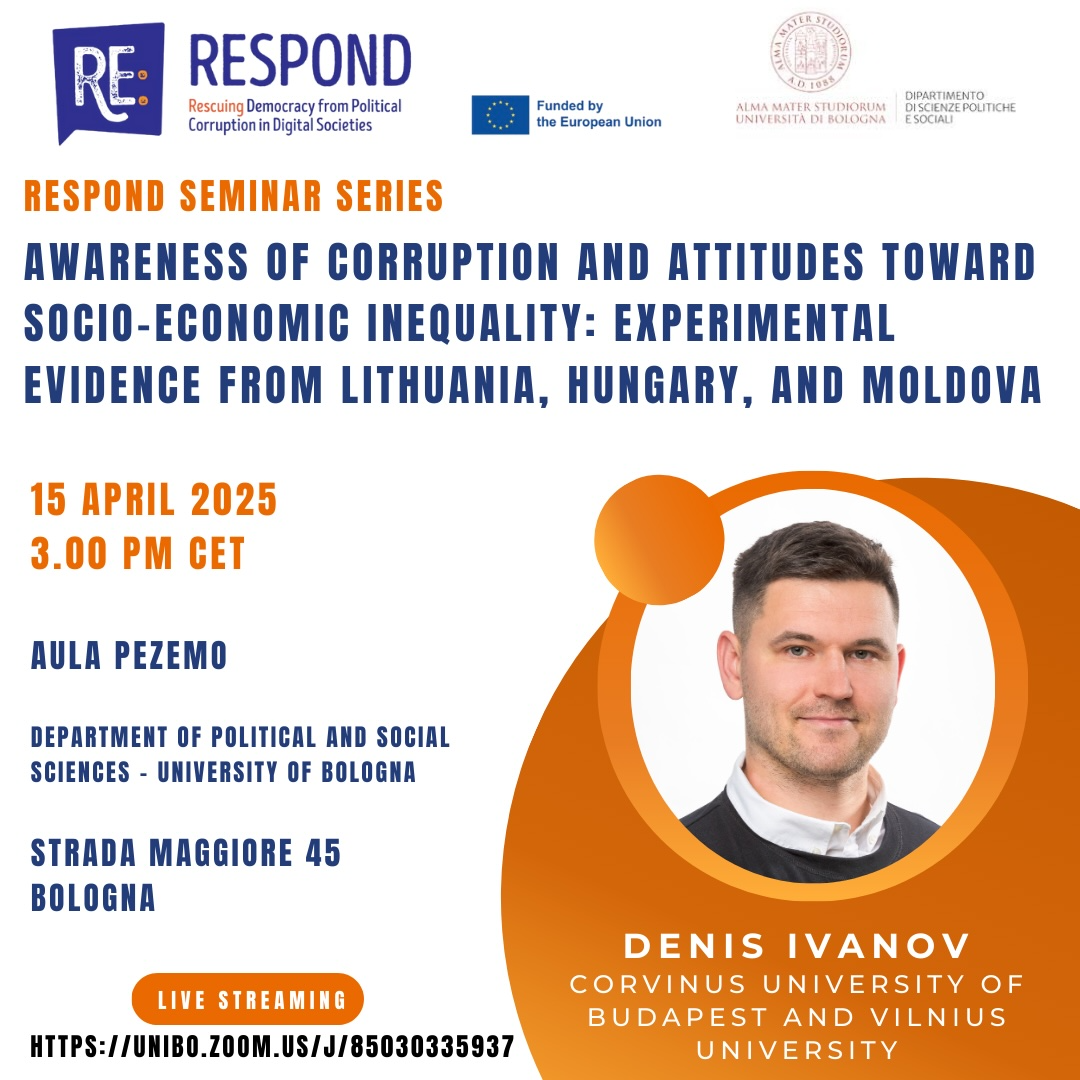Awareness of Corruption and Attitudes Toward Socio-Economic Inequality: Experimental Evidence from Lithuania, Hungary, and Moldova

The Horizon Europe project RESPOND (Rescuing Democracy from Political Corruption in Digital Societies) led by the Department of Political and Social Science at the University of Bologna, is pleased to invite you to its hybrid seminar series.
Join us on April 15 at 3 PM (CET)for the semminar titled “Awareness of Corruption and Attitudes Toward Socio-Economic Inequality: Experimental Evidence from Lithuania, Hungary, and Moldova”, presented by Dr. Denis Ivanov (Vilnius University).
This open seminar will be held both online and in person at Aula Pezemo, Palazzo Hercolani, at the University of Bologna.
We look forward to your participation!
About the seminar:
Corruption, defined as the abuse of entrusted power for private gain, poses a significant barrier to human prosperity. Beyond its staggering economic implications, with losses estimated between US$1.5 to US$2 trillion (roughly 2 percent of global GDP), corruption stifles institutional development, corrodes the rule of law, and destroys public trust in governments. Similarly, high levels of inequality—whether rooted in income or wealth, sex, age, disability, sexual orientation, race, class, ethnicity, religion, or opportunity—are detrimental and often linked to conflict, political disparity, and diminished quality of life and happiness. Despite the prominence and policy relevance of these issues, as reflected in SDG Goals 16 and 10 and EU anti-corruption initiatives, their interconnection remains unclear, especially in the minds of people living in places where both issues are salient. While the literature on the connections between corruption and inequality has grown in recent years, it has predominantly used aggregates and focused mostly on correlational evidence at the cross-country level. This paper provides the first experimental and causal evidence testing the hypothesis that being informed about a situation of corruption within a country causes people to overestimate the magnitude of socio-economic inequality. I conducted three pre-registered face-to-face vignette survey experiments (n=1000 in each country) on a representative national omnibus-type sample in three countries: Lithuania, Hungary, and Moldova. Half of the respondents were exposed to a short vignette that includes three dimensions: global ranking, survey evidence, and policy efforts. This treatment is based on excerpts from annual reports on corruption by Transparency International (without mentioning the name of the organization), as well as results on corruption perceptions from the Global Corruption Barometer and EU reports on progress in the fight against corruption. I theorize that exposure to a corruption situation in a particular country, on average, causes a one standard deviation increase in responses to questions related to the inequality of wealth, income, rural-urban divide, and opportunities. At the same time, I expect differences in the effect of treatment across the three countries, based on the level of corruption in each—highest in Moldova, followed by Hungary and Lithuania. The expected heterogeneity in the treatment effect is by voting choice in the last elections, institutional trust, socio-economic characteristics, demographics, and the level of subjective economic insecurity. The surveys are currently in the process of fieldwork, and early results will be available in December. The findings will have important ramifications for our understanding of how corruption influences people’s perceptions of socio-economic inequality, particularly in Central and Eastern Europe.
This project has received funding from the Research Council of Lithuania (LMTLT), agreement No. S-PD-24-72
About the presenter:
Dr. Denis Ivanov is an Assistant Professor in Quantitative Political Economy at Corvinus University of Budapest and a research fellow at the Institute of International Relations and Political Science (IIRPS) at Vilnius University. Previously, he served as an Early Stage (Marie Curie) Researcher in a Horizon 2020 program on populism (FATIGUE).
His research interests include socio-economic inequality, populism, the political economy of transition, and the dynamics of political parties and causality. Within the FATIGUE project, he explored the consequences of growing socio-economic inequality in Europe, which extends beyond mere political frustrations to encompass the rising success of populist and anti-establishment parties. He received the Hans Raupach Best Paper Award 2020 at the 12th Joint IOS/EACES Summer Academy on Central and Eastern Europe. He has extensive work experience in the financial industry within the corporate sector, spanning across Moldova, Lithuania, Italy, and Hungary.
